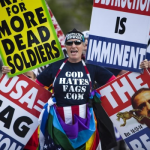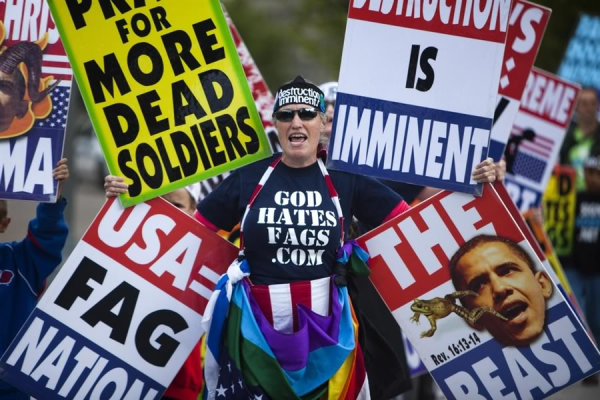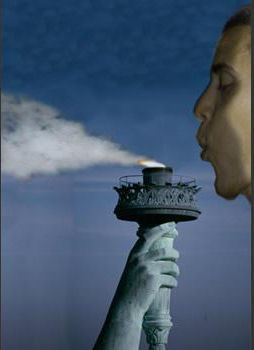
Deprecated: trim(): Passing null to parameter #1 ($string) of type string is deprecated in /home/aoiusa/public_html/wp-content/plugins/sexybookmarks/public.php on line 388
Deprecated: trim(): Passing null to parameter #1 ($string) of type string is deprecated in /home/aoiusa/public_html/wp-content/plugins/sexybookmarks/public.php on line 394
Deprecated: trim(): Passing null to parameter #1 ($string) of type string is deprecated in /home/aoiusa/public_html/wp-content/plugins/sexybookmarks/public.php on line 400
Source: Orthodoxy and Heterodoxy | By Fr. Andrew Damick
(KWCH Eyewitness News) They’re known worldwide as the group from Kansas that protests at soldiers’ funerals, and says God hates America because it allows homosexuality. Now, Westboro Baptist Church is reacting to the defection of a key member.
“She just decided she did not want to obey God,” spokesman Steve Drain says. “She did not want to obey scripture.”
She is Megan Phelps-Roper. The 27-year-old had risen to become a leader in the family church founded her grandfather.
In a blog post from Megan Phelps-Roper entitled “Head Full of Doubt / Road Full of Promise” it was announced to the world yesterday that a leading member in the execrable Westboro Baptist Church had, along with her younger sister, in the words of the news story linked above, “defected” and “apologized” for their actions as members of WBC.
What the news story (and probably other news stories in the days to come) doesn’t seem to get is that this isn’t just a “defection.” Reading Megan’s own words, as well as an excellent essay by a reporter who was privy to Megan’s choice to leave WBC, it’s clear that this moment is no less than a conversion. Here’s Megan:
In a city in a state in the center of a country lives a group of people who believe they are the center of the universe; they know Right and Wrong, and they are Right. They work hard and go to school and get married and have kids who they take to church and teach that continually protesting the lives, deaths, and daily activities of The World is the only genuine statement of compassion that a God-loving human can sincerely make. As parents, they are attentive and engaged, and the children learn their lessons well.
This is my framework.
Until very recently, this is what I lived, breathed, studied, believed, preached – loudly, daily, and for nearly 27 years.
I never thought it would change. I never wanted it to.
Then suddenly: it did.
This is what conversion is—to have one’s whole framework for living and thinking and understanding, which all seems perfectly normal and rational, called into question and finally left behind. I don’t think this point can really be stressed enough. So often when we look at people whose beliefs contradict our own, we usually write them off as stupid, ignorant or evil. And they may well be any or all of those things. But when the only data you have for understanding the world is a matrix of judgment and wrath from God, then it makes perfect sense to work tirelessly to extend that exact same judgment and wrath to the world.
But even then, even if one has a lot more data, that doesn’t mean that people who look at that same data will come to the same conclusions. I often wonder how someone can look at all the same data I have and not become an Orthodox Christian. I really don’t understand it. I wish I did. But I know plenty of people smarter than I, better informed than I and more sincere than I who have indeed looked at that data and not made the same choice I did.
I don’t think the media gets this, though, because the popular culture makes the assumption (despite it being proved so obviously wrong so very often) that anyone who is educated will of course hold a particular belief. “Education is the key,” etc. But sometimes it’s not. In fact, most of the time, it’s not. The media will understand this essentially as a defection based on a couple of young women finally learning some things they didn’t know before. But Megan was a major user of social media and a constant media face for WBC. She was exposed to all kinds of things that contradicted WBC doctrine yet she remained not only in the fold but an enthusiastic leader within it.
What happened? She converted. Further evidence for this is what always happens after conversion—the world seems new, unfamiliar and somewhat confusing. Megan writes: “Where do you go from there? I don’t know, exactly. My sister Grace is with me, though. We’re trying to figure it out together.” There is a freshness and a sense of possibility even in the midst of the confusion. And her Father Grace is with her, too.
Conversion also requires making sense of one’s past life, trying to incorporate all those previous experiences into the new vision of the world that has arisen. This process is normal to converts and usually lasts for years. I can only imagine what kind of processing a former member of WBC will have to undertake:
We know that we can’t undo our whole lives. We can’t even say we’d want to if we could; we are who we are because of all the experiences that brought us to this point. What we can do is try to find a better way to live from here on. That’s our focus.
I hope the world will sit up and take notice, not to a “defection” story about the triumph of exposure to media and information, but rather to a story about redemption, about spiritual conversion. That’s the real story here. One moment, she was Megan Phelps-Roper, Hater of Fags, and the next, she was something else.
Redemption. It’s possible.

The Rev. Fr. Andrew Stephen Damick is pastor of St. Paul Orthodox Church of Emmaus, Pennsylvania, author of Orthodoxy and Heterodoxy (Conciliar Press, 2011), and host of the Orthodoxy and Heterodoxy and Roads from Emmaus podcasts.





